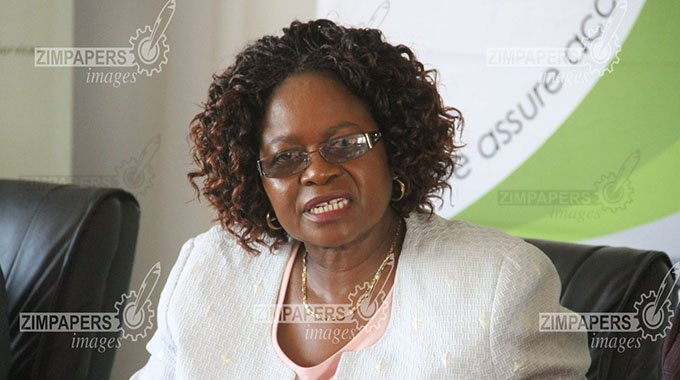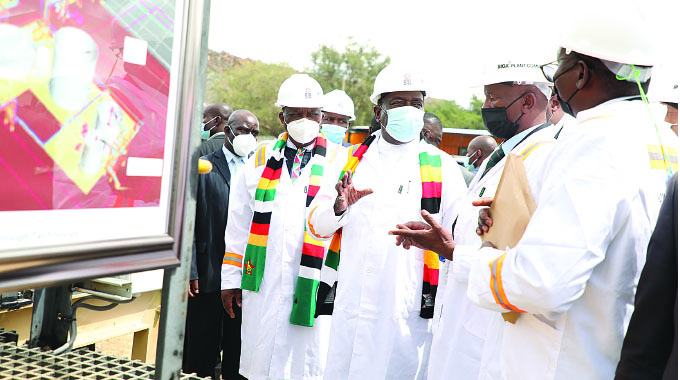Rural areas turn into greenbelts

Herald Reporters
COMMUNITIES across the country are reaping huge rewards from irrigation schemes that have been established by President Mnangagwa as part of a programme to climate-proof the country’s agriculture and ensure food security.
In 2020, President Mnangagwa launched the National Agricultural Recovery Plan that seeks, among other things, to create greenbelts in areas such as Masvingo, Bulawayo, Kanyemba, the two Matabeleland provinces, and Middle Sabi, to ensure that the country can enjoy two maize cycles per year under irrigation, and that is unfolding across the country as several irrigation schemes are now operational or nearing completion.
In Gokwe, the area’s first-ever irrigation scheme is expected to plant its first winter crop in June with villagers saluting Government for bringing water to the semi-arid region.
The 134-hectare Mutange Irrigation Scheme was established in 2017 as the Second Republic forges ahead with its developmental agenda under the National Development Strategy 1 (NDS1), in which no one and no place is left behind.
The scheme, which is only left with the installation of a 500kv transformer for power, has state-of-the-art centre pivots. It is set to benefit over 270 families and is being funded by Government together with its development partner, the International Fund for Agricultural Development (IFAD).
A villager, Mr Arnold Gondongwe, said it was the first time the district has an irrigation scheme and everyone in the village was excited by its prospects of enhancing food security in the district.
“We are very excited as villagers and we can’t wait to start benefiting from this noble project from our Government,” he said.
Mrs Gloria Masuku, who also registered to be part of the scheme, said: “We are very happy that we now have our irrigation scheme and we will be tilling all year round. I can’t wait for the scheme to be ready.”
The Minister of State Responsible for Monitoring of Special Agriculture Projects, David Marapira, who toured the scheme recently, said the project was scheduled to have its first winter wheat crop this year.
“Let us guard our property jealously and expose those who might want to steal and vandalise the property. I am told the pivots are being vandalised, fence was stolen, such moves are bad and counter development,” he said.
Midlands Provincial Irrigation Engineer, Mr Shingirirai Zano, said Mutange Irrigation Scheme will be extended to up to 200 hectares and will be the second biggest scheme in the province.
“The feeder dam, Mutange Dam, has capacity to hold 5 200 megalitres and that will be enough for the whole scheme,” he said.
In Masvingo, the creation of greenbelts is forging ahead with Agriculture, Lands, Water, Fisheries, and Rural Development Minister Dr Anxious Masuka, commissioning Banga Irrigation Scheme in Chivi South that will benefit nearly 300 households.
The irrigation scheme was rehabilitated under the Smallholder Irrigation Revitalisation Programme (SIRP) rolled out by Government to make sure Zimbabwe is food secure in the wake of recurrent droughts induced by climate change.
Commissioning the irrigation scheme last Saturday, Dr Masuka said Government was delivering on its promise of not leaving no one and no place behind towards the attainment of Vision 2030.
“We are on a drive to renovate all idle irrigation schemes so that we improve food security for the people in rural areas. We are introducing programmes to protect farmers in irrigation systems such as formalising the farming business so that schemes sustain themselves thereby reducing Government burden on social welfare cases.”
Dr Masuka said Government continues to pour resources into irrigation development with over US$650 000 having been injected into the rehabilitation of Banga irrigation scheme.
Minister Masuka also urged people to grow crops following their natural farming regions.
“What is grown in an agro-ecological region is not determined by the farmer but must be determined by the agro-ecological region.
“There are 450 irrigation schemes like Banga that we are commissioning and out of them less than 300 are fully functional yet irrigation is the way to go.”
The programme co-ordinator for SIRP, Mr Audreck Mukorera, said 17 irrigation schemes in Masvingo province from six districts namely Chiredzi, Chivi, Gutu, Mwenezi, Bikita, and Zaka will be rehabilitated, adding about 1 247 hectares into the provincial greenbelt logbook.
“We have set a target for 5 091 households across Masvingo to benefit from rehabilitated irrigation schemes in areas which receive low rainfall across the province,” he said.
The Minister of State for Masvingo for Provincial Affairs and Devolution, Ezra Chadzamira, hailed the rehabilitation of irrigation schemes adding that Masvingo has the potential to become the breadbasket of the country based on its potential to develop more irrigation schemes using available water bodies.
“Masvingo province holds 52 percent of the country’s water bodies and the revitalisation of irrigation schemes will go a long way as we move towards our vision to become the breadbasket of the country.”
Government is rehabilitating and developing more irrigation schemes as the shift from rain-fed agriculture to irrigation, intensifies in the wake of climate change.
Masvingo has the highest dam density in Zimbabwe with a scope to irrigate over 50 000ha.
Plans are also afoot to develop the Lowveld Irrigation Development Master Plan that targets over 200 000ha under industrial and plantation crops using dams such as Tugwi-Mukosi and perennially flowing rivers that bisect the Lowveld.
In Mashonaland East, the rehabilitation of roads, coupled with an irrigation facility mean that people have water for their crops and the road to take them to the market.
At Chigondo Business Centre, dozens of smallholder farmers are doing agricultural activities under the Chigondo Irrigation Scheme.
Two kilometres north of the irrigation scheme is Chigondo Dam which feeds the surrounding communities and the irrigation scheme.
The scheme, which is in Ward 9, Gwatidzo Village, is a source of income for many but their hard-earned income has been eroded every year by transporters who charge them an arm and a leg to ferry their produce to either Wedza or Harare markets.
Transporters, said the chairman of the Chigondo Irrigation Scheme, Mr Moses Gwatidzo, charge a lot of money citing poor roads, which damage their vehicles.
Also, for some years, the community had no bus plying their route and the only transport available were the mushikashika (Honda Fit vehicles) which illegally ply the Wedza-Chigondo route and cannot transport the heavy and abundant farm produce from the irrigation scheme.
This unavailability of suitable transport due to poor roads nearly killed the hard-working spirit of the Chigondo Irrigation Scheme beneficiaries.
However, this will be a challenge of the past, with the road being rehabilitated. In addition, even conventional buses will compete and jostle for business in Chigondo, forcing fares to be on a fairer trajectory.
“I started practising commercial agriculture under this irrigation scheme in 1992 and I am one of the competitive farmers around here. Our agricultural activities are mainly aimed at improving our livelihoods. However, this has been hard because we did not have good roads to take our farm produce to markets be it in Murewa or Harare,” said a beneficiary of the scheme.
In Mashonaland Central, the Second Republic has come to the rescue of people in Chinehasha Village in Chiweshe with plans afoot to resuscitate the Chinehasha Irrigation Scheme which was started in 2015 but failed to take off.
As the Government focuses on irrigation due to the effects of climate change, Chinehasha Irrigation Scheme is set to become a game-changer in the province.
The irrigation scheme, which will be sustained by Lilstock Dam, will boost agriculture production and turn the area into a green belt.
In Matabeleland South, Government is finalising preliminary works towards the full-scale implementation of the US$35 million 2 500ha Zhovhe Irrigation Project that is set to turn the town of Beitbridge into a greenbelt.
Late last year, President Mnangagwa launched the Bubi-Lupane Irrigation Scheme as a pilot project for an integrated business model to be replicated across all provinces as part of the national food security strategy whereby the farmers partner Arda in a well-managed operation and receive dividends plus some of the crop for home consumption.
Arda is replicating the Bubi-Lupane Irrigation Scheme across another 450 irrigation schemes across the country with the aim of alleviating poverty.











Comments